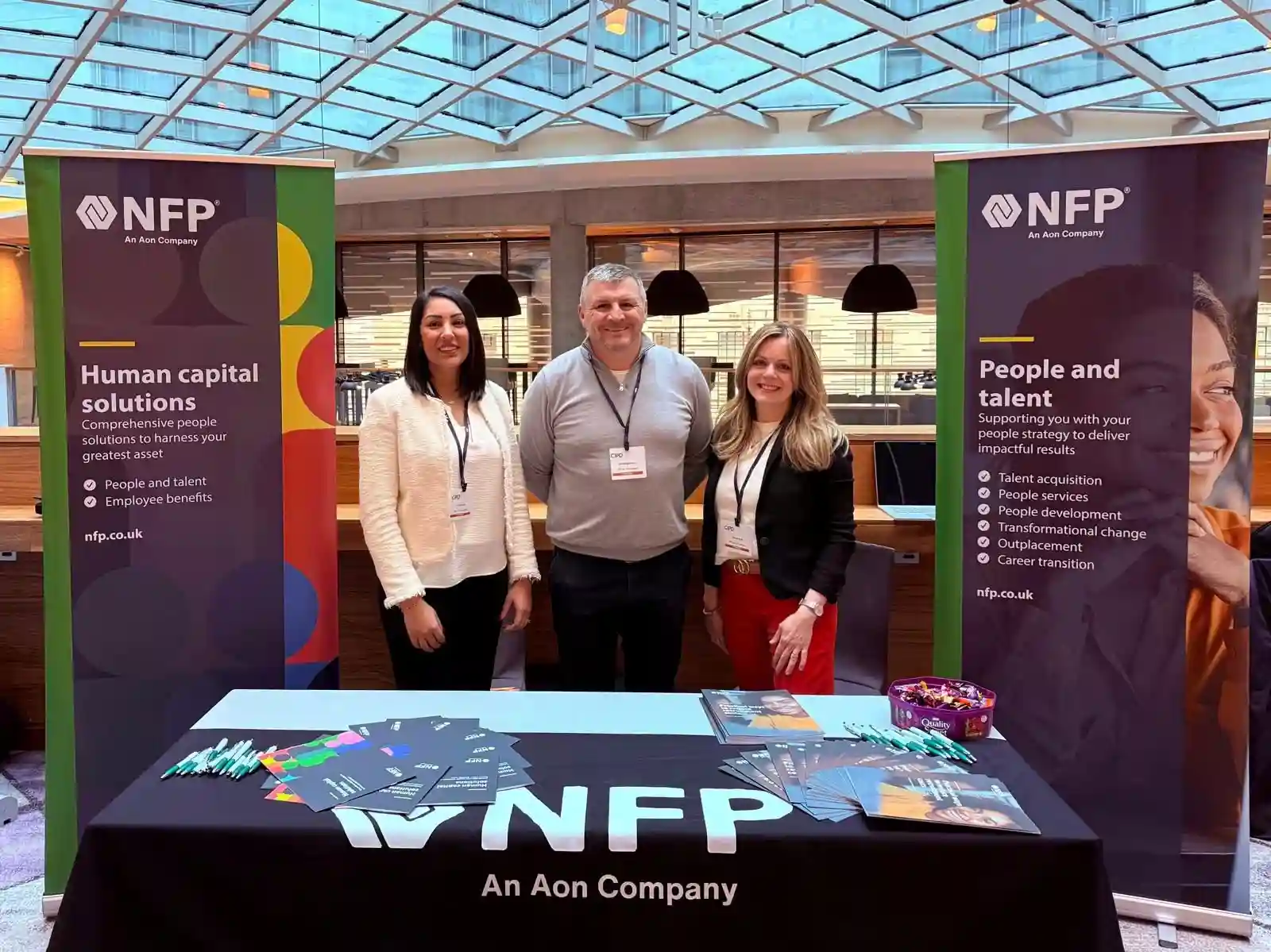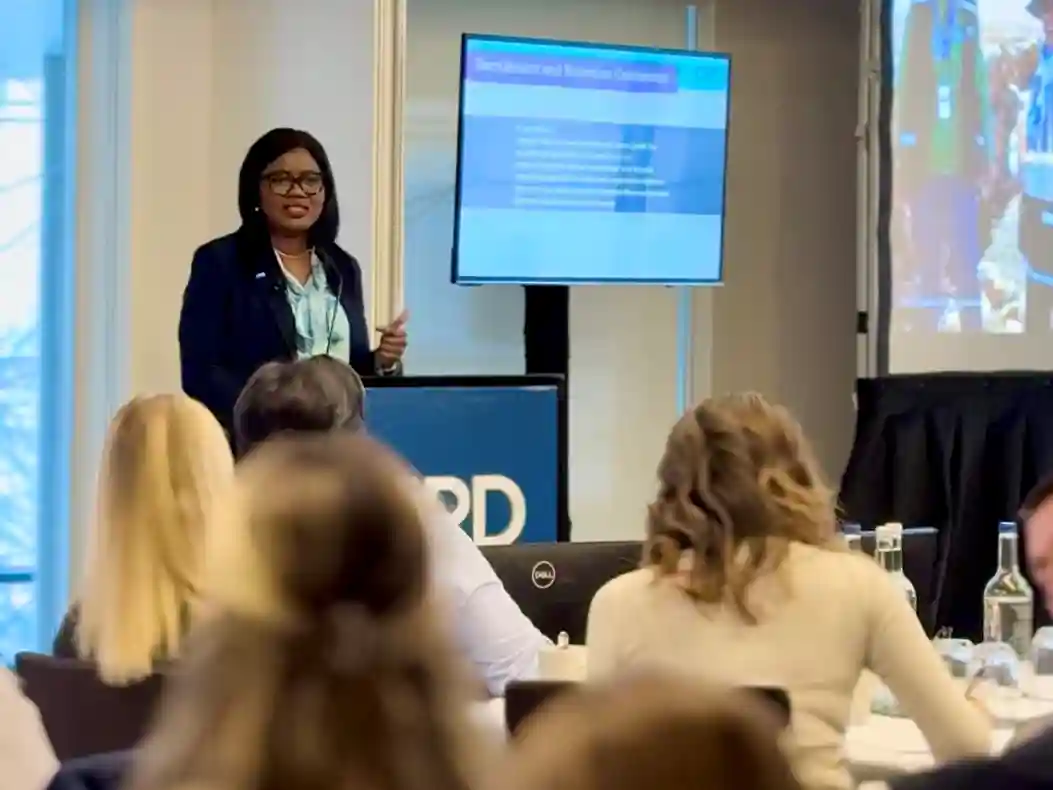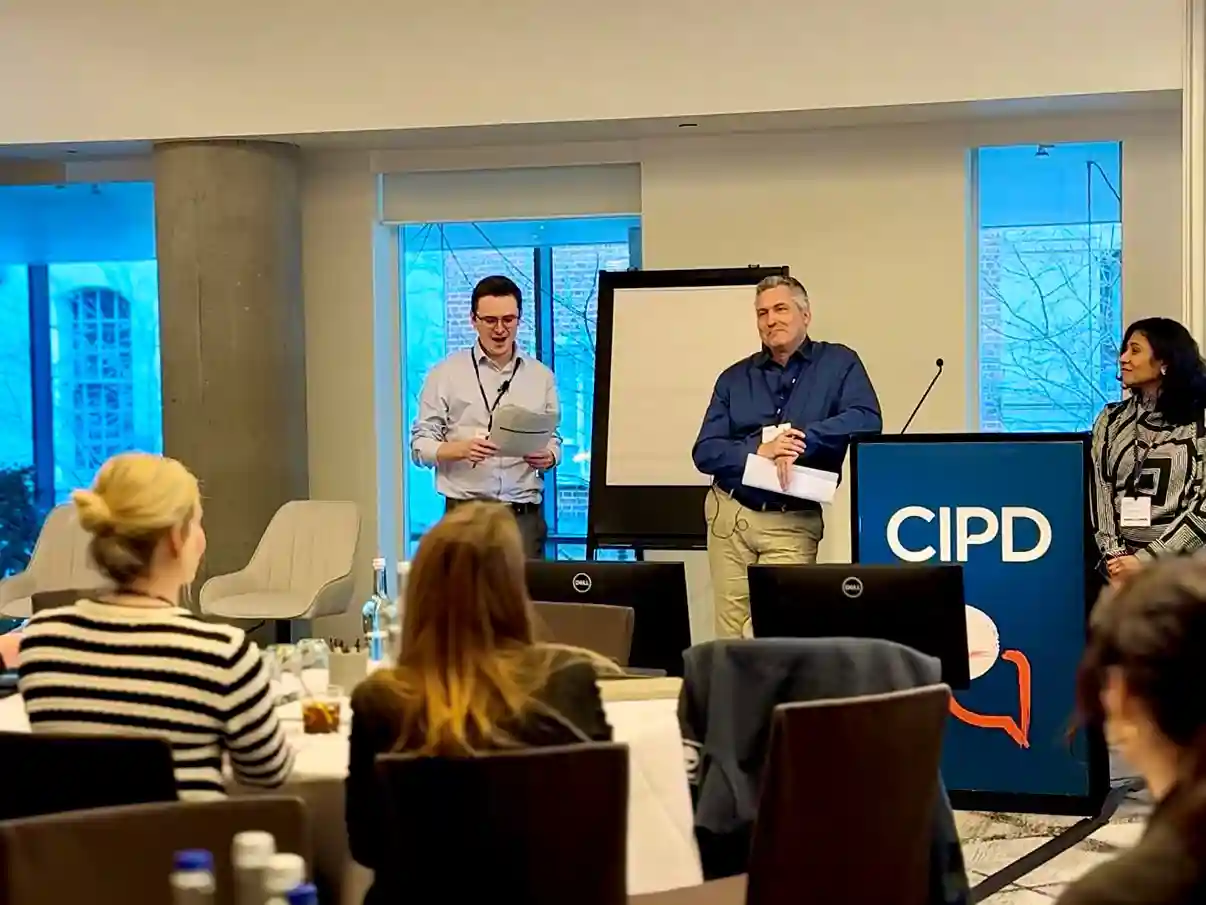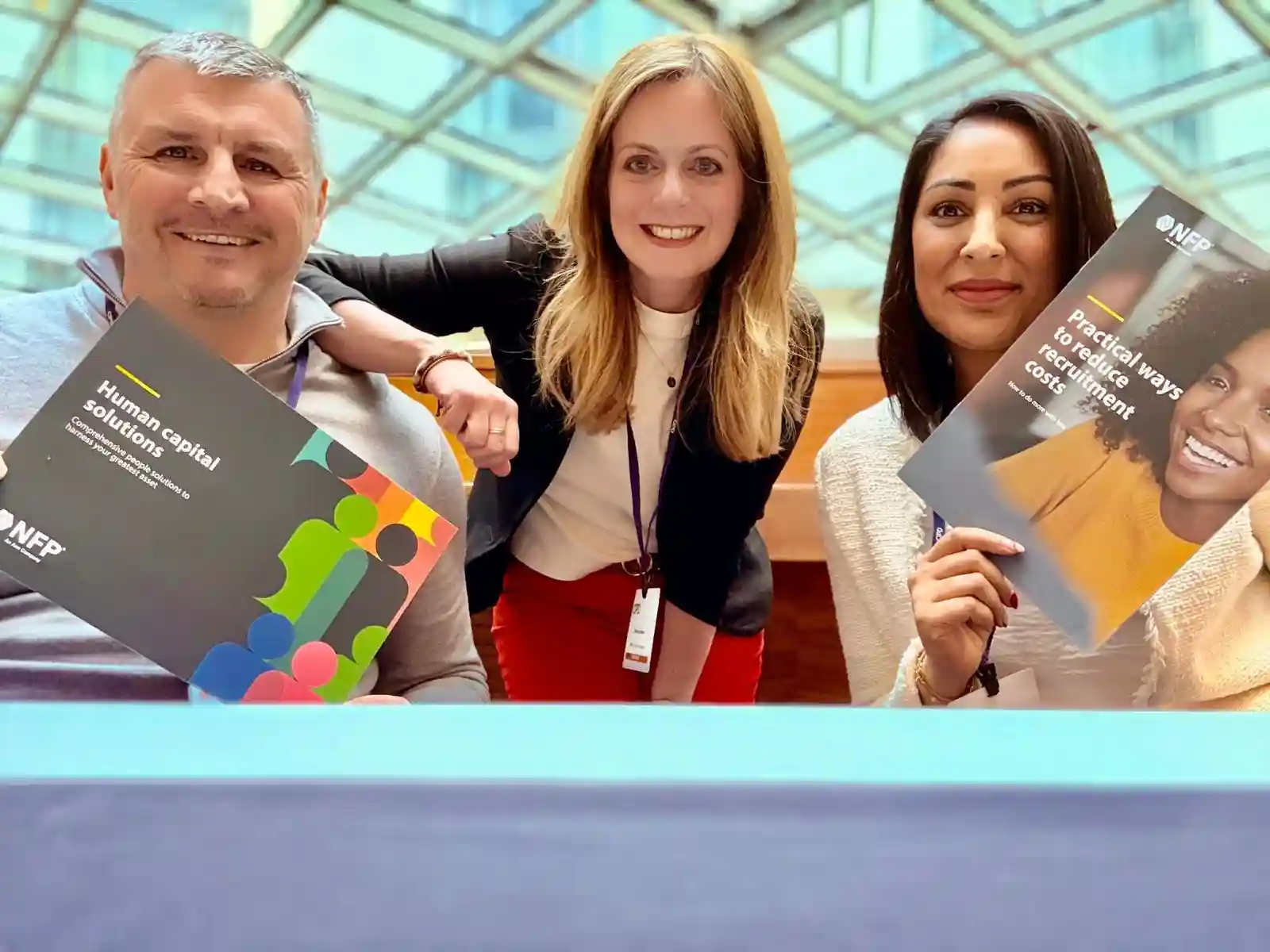On 4th March, NFP had the pleasure of sponsoring and attending the CIPD Recruitment and Retention event – a day packed with discussion, expert-led sessions and the chance to learn first-hand what organisations are doing to fix some of the biggest recruitment and retention challenges we’re all currently facing. This type of event is perfect for realising that you’re not alone in these challenges – and the opportunity to learn from and speak with other HR and Talent specialists who are successfully navigating and solving them, is priceless.

As an organisation deeply embedded supporting businesses to attract and retain their top talent and provide people solutions across the employee lifecyle, NFP were proud to support this event. The sessions throughout the day reinforced just how essential it is for businesses to take a strategic, people-centric approach to recruitment and retention in today’s competitive landscape.
Inclusive recruitment: expanding the talent pool
One of the first key discussions of the day focused on widening the talent pool and developing inclusive recruitment strategies. The panel, featuring industry leaders from Maersk, Plan International, and De Beers Group, emphasised that inclusive hiring is more than a ‘nice to have’ – it’s a strategic decision that shapes business success, innovation, and culture.
A key takeaway was the need for a clear business rationale for inclusivity. This isn’t just about meeting quotas; it’s about defining the kind of organisation you want to be. Are you building a business that values social impact, long-term sustainability, and diverse perspectives? Moving the dial requires more than good intentions – it demands measurable action, from identifying biases in hiring processes to using diverse panels and data-driven insights to create fairer, inclusive opportunities.
Real progress happens when DEI is embedded into long-term strategy rather than treated as a standalone initiative. Organisations that integrate inclusivity into business incentives and leadership accountability don’t just attract diverse talent – they create environments where people want to stay, grow, and contribute to something bigger.

AI in recruitment: a help or a hindrance?
AI in recruitment is no longer a futuristic concept – it’s here, reshaping how organisations attract and assess talent. But with its promise of efficiency and objectivity comes an important question: does AI truly level the playing field, or does it risk reinforcing existing biases?
The discussion, hosted by Amazon, on AI-driven hiring made one thing clear: technology should enhance, not replace, human judgment. Used well, AI can streamline processes, reduce administrative burdens, and help identify potential bias in hiring decisions. But without careful oversight, it can also replicate the very problems it’s designed to fix. Algorithms are only as good as the data they’re trained on, and if that data reflects historical bias, AI can amplify inequalities rather than eliminate them.
Businesses that get AI right are those that approach it with intent – understanding its strengths while recognising its limits. The key is balance. Automation can increase efficiency, but the human element – critical thinking, emotional intelligence, and ethical decision-making – must remain at the heart of recruitment. The goal isn’t just to hire faster, but to hire better, ensuring fairness, transparency, and genuine inclusivity in every step of the process.
Attracting and retaining Gen Z talent
With Gen Z set to make up 27% of the workforce by 2025, businesses can’t afford to treat them as just another generation – they bring different expectations, priorities, and ways of working. The case study session featuring Virgin Media O2 and L’Oréal UK & Ireland made it clear: attracting and retaining Gen Z talent isn’t just about offering a job; it’s about offering a workplace that aligns with their values.
This generation wants more than a paycheck. They seek purpose-driven work, flexibility, and clear career development pathways. They expect employers to take a stand on social issues, create genuinely inclusive environments, and invest in their long-term growth. Mental health is also a non-negotiable – Gen Z prioritises well-being and expects companies to do the same, whether through supportive leadership, psychological safety, or prioritising mental health.
Traditional employer branding won’t cut it – Gen Z looks for authenticity, transparency, and workplaces where they can make a real impact. Businesses that succeed in engaging them will be the ones that listen, adapt, and evolve. This isn’t about quick fixes – it’s about creating a culture where younger employees feel valued, supported, and motivated to stay and grow.
The power of a strong employee value proposition (EVP)
In a competitive recruitment market, a strong EVP isn’t just a differentiator, it’s a necessity. The World Café sessions provided a deep dive into how businesses are rethinking their approach, ensuring their EVP isn’t just words on a career site but a lived experience. Hearing first-hand how companies are future-proofing their EVP – through employer branding, wellbeing initiatives, flexibility, career development, leadership engagement, benefits, and sustainability – highlighted that the best EVPs are built for the long term. Employees want more than a salary; they’re looking for meaningful work, opportunities to grow, and a workplace where they feel valued.
The discussion reinforced that EVP isn’t static. It evolves with workforce expectations, industry trends, and business priorities. Companies that actively listen, adapt, and communicate their EVP effectively don’t just attract top talent – they build engaged, committed teams who stay and thrive.

Future-proofing through skills development
The afternoon session on skills-based hiring struck a chord, reinforcing that businesses can no longer afford to take a passive approach to workforce development. Retention isn’t just about keeping employees – it’s about keeping them engaged, challenged, and equipped for the future.
Continuous learning and internal mobility are essential to long-term success, and companies that invest in upskilling aren’t just benefiting their employees – they’re strengthening their own resilience. Insights from the London Stock Exchange Group highlighted how businesses can embed skills development into their talent strategies, ensuring employees feel valued, capable, and ready for evolving roles. The message was clear: when companies prioritise growth from within, they don’t just reduce hiring pressures – they build a more adaptable, motivated, and future-ready workforce.
Candidate experience: lessons from the Financial Times
The Financial Times shared its approach to managing high application volumes while maintaining a seamless, engaging candidate experience. The key takeaway? First impressions matter – employers must ensure their hiring process is efficient yet personalised, from the initial application through to onboarding. At NFP, we specialise in optimising recruitment strategies to enhance efficiency, reduce costs, and improve time-to-hire, helping businesses attract the right talent while strengthening their employer brand.
Creating a culture of openness
The final fireside chat on workplace trust and transparency was a powerful way to close the event. Leaders from UBS and other organisations shared real-world strategies for creating environments where employees feel heard, valued, and invested in the company’s success.With retention remaining a challenge for many businesses, the discussion reinforced that trust isn’t built through policies alone – it comes from ongoing, open communication and leadership that actively listens and responds. Employee sentiment plays a crucial role here; when people feel their feedback leads to meaningful change, engagement and loyalty grow. A lack of transparency, on the other hand, fuels disengagement and higher turnover.
A culture of openness isn’t just about making employees feel included – it’s about ensuring they see their voices making an impact. Businesses that prioritise trust and transparency don’t just retain talent; they create workplaces where people want to stay, contribute, and thrive.
Our reflections
The event was filled with so many interesting discussions, fresh perspectives, and great conversations. It was a fantastic opportunity to connect with professionals who are just as committed as we are to shaping the future of work. For NFP, being part of this event felt especially meaningful, as we continue to support a range of organisations in strengthening their people strategies - whether through optimising recruitment, developing talent, or driving long-term organisational change.

We left the conference with so many new ideas, useful connections, and a clearer view of the challenges and opportunities in recruitment and retention. It was a great opportunity to share experiences, hear from industry leaders, and connect with others facing the same issues. A big thank you to CIPD for organising such a worthwhile event – we’re already looking forward to the next one.
If you’d like to chat about how NFP can help with your recruitment and retention strategies, get in touch.

Author
Rebecca Meek, Client Partner - People and Talent
Rebecca partners with businesses to deliver strategic people and talent solutions, helping organisations shape and implement effective workforce strategies across the employee lifecycle. With experience in HR strategy, talent management, and organisational change, she works across a range of industries to optimise recruitment, enhance employee engagement, and develop sustainable people-focused initiatives.
As part of NFP, Rebecca is committed to helping clients build strong, adaptable workforces that support their long-term success, ensuring they attract, retain, and develop the talent needed to thrive.